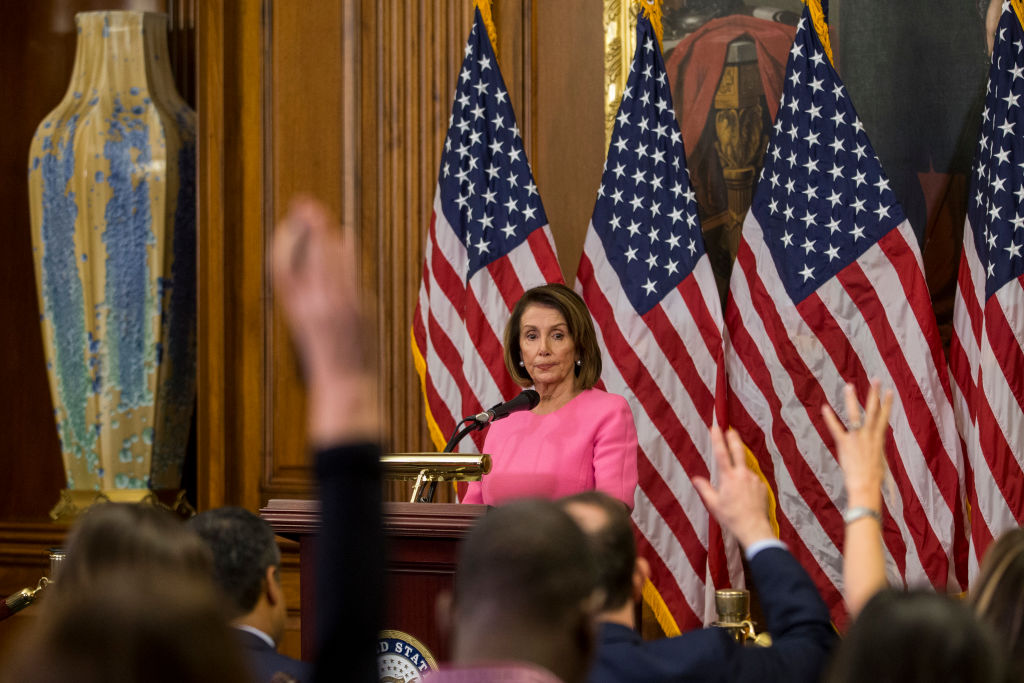Nearly three-quarters of the American public and a historic number of Democratic lawmakers support Medicare for All, but the House Democratic leadership is considering using its newly won majority to impose a rule that would “recklessly betray” the grassroots forces that put them in power by making single-payer and other progressive priorities impossible to enact.
According to a list of Democratic proposals obtained by the Washington Post, House Minority Leader Nancy Pelosi (D-Calif.)—who is currently fighting back against efforts to prevent her from becoming House Speaker—is pushing for a rule that would “require a three-fifths supermajority to raise individual income taxes on the lowest-earning 80 percent of taxpayers.”
In response, MoveOn.org called the proposal “a staggeringly bad idea.”
Though the proposed rule is framed as an effort to protect the financial well-being of middle class Americans, Eric Levitz of New York Magazine pointed out that “while progressives are committed to increasing the discretionary income of the bottom 80 percent, that does not necessarily mean keeping their tax rates frozen at historically low levels.”
“A bill that required those households to pay a new, smaller monthly sum to the government—so as to fund a single-payer system that would actually reduce their cost of living by delivering radically cheaper healthcare services—could hardly be called regressive,” Levitz notes. “And the same can be said for legislation establishing universal child care, paid family leave, or any other program aimed at easing the middle class’s financial burdens.”
“Equating support for middle-class families—with opposition to increasing their tax rates—is a conservative project, which Democrats have no business advancing,” Levitz added. “If the party wishes to establish structural barriers to policies that would hurt the middle class, why not require a three-fifths majority to cut Medicaid, Medicare, or Social Security?”
This is wrong-headed on so many levels. https://t.co/oN0o6b6RE8
— Claire Sandberg (@clairesandberg) November 16, 2018
Combined with Pelosi’s expressed commitment to reviving the “economically illiterate” pay-go rule—which would require that all new spending be offset by spending cuts or tax hikes—the proposed tax restriction would completely undercut Medicare for All, free public college, a federal jobs program, and other ambitious left-wing policies by dramatically restricting the party’s ability to raise revenue and effectively handing Republicans the power to block progressive legislation.
After many Dems campaigned on Medicare For All, the first thing the party plans to do in power is establish rules that bar the House from raising taxes on 80% of Americans — and require it to fully finance all new programs — precedents that would make M4A impossible to enact. pic.twitter.com/AladbpsUzz
— Eric Levitz (@EricLevitz) November 16, 2018
“This is disastrous policy and messaging,” argued Richard Phillips, senior tax policy analyst for the Institute on Taxation and Economic Policy (ITEP).
The proposed rule, Phillips added, would constrain “revenue that can be generated for many of the kind of bold investments we need to be making in terms of healthcare, education, infrastructure, etc.”
Progressive advocacy groups and experts registered their outrage at Pelosi’s rule proposal on social media on Friday, with economist Stephanie Kelton warning that the Democratic leader’s measure would completely “kneecap the progressive agenda.”
Pelosi’s new procedural rules would kneecap the progressive agenda. “Between now and January, the progressive forces within Team Blue’s tent must work to nip this rule in the bud.” https://t.co/0fNL8XYHq6 pic.twitter.com/3VSXZkPyz0
— Stephanie Kelton (@StephanieKelton) November 16, 2018
Media that fights fascism
Truthout is funded almost entirely by readers — that’s why we can speak truth to power and cut against the mainstream narrative. But independent journalists at Truthout face mounting political repression under Trump.
We rely on your support to survive McCarthyist censorship. Please make a tax-deductible one-time or monthly donation.
